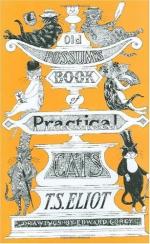|
This section contains 353 words (approx. 1 page at 400 words per page) |

|
Blenkinsopp, Joseph. "Macavity and Moriarty." The Baker Street Journal 28 (1978): 103-104. A discussion of the influence of the Sherlock Holmes stories on Eliot.
Campbell, Jeanne, and John Reesman.
"Creatures of Charm: A New T. S. Eliot Poem." Kenyon Review 6, 3 (Summer 1984): 25-33. A discussion of Eliot's poem responding to an acquaintance who complained about his "tough" cats.
Clowder, Felix. "The Bestiary of T. S. Eliot." Prairie Schooner 34 (Spring 1960): 30-37. An argument that Old Possum's Book of Practical Cats is serious and theological.
Douglass, Paul. "Eliot's Cats: Serious Play behind the Playful Seriousness."
Children's Literature 11 (1983): 109124. A reply to Hodge in which Douglass insists that Eliot's purpose is not to judge his Cats but to fantasize things normally forbidden to children, to stress the value of daydreaming, and to express "Eliot's love for dog-, cat-, and mankind, and his desire to keep alive in himself the irreverent child."
Hedberg...
|
This section contains 353 words (approx. 1 page at 400 words per page) |

|




